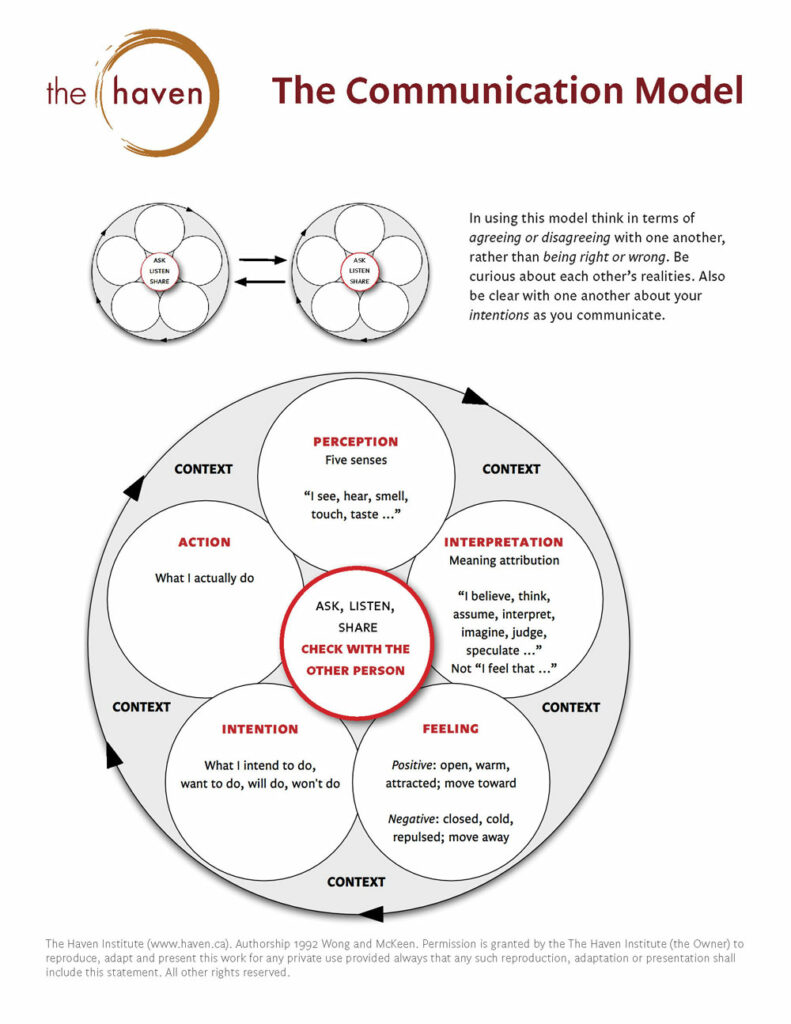Communication is central to what we teach at The Haven. Our Communication Model is a tool that people can use to be in relationship with one another and to learn about themselves and each other. The Haven’s focus on self-responsibility, curiosity, embodiment and relationship is exemplified in this model. Before The Haven itself existed, its founders, Bennet Wong and Jock McKeen, embarked on what they described as a ‘relationship project’, in which they set out to know one another and themselves as best and as honestly as they possibly could. The communication model they developed out of ideas they encountered at that time became the principal means through which they did this. Thirty years later they describe it as their ‘spiritual practice’ and continue to experience it as thoroughly practical and deeply meaningful. On one level, The Haven Communication Model is simply a description of what goes on when people try to communicate.

The idea we emphasize in our courses is that by understanding this process, we can move through it more consciously, more self-responsibly, and with more awareness of our choices. In so doing we can immeasurably deepen and enrich our relationships. One of the circles in the diagram above contains the word perceptions. Every moment, we take in through our senses – sight, sound, smell, touch, taste – thousands of items of ‘data’. In themselves, these have no meaning at all. It is through interpretation that we make sense of all this information. Based on our interpretations we experience body feelings, which are broadly either ‘positive’ or ‘negative’. For example, if I see that my partner’s eyes are red and sore-looking, I will interpret that perception (based in part on my context, as shown in the diagram). Perhaps I will decide that my partner has been crying because he or she is upset about something I said or did, maybe a fight we had the day before. Believing that, I might feel ‘bad’ in some way, maybe about how I have behaved, or maybe with my partner for not ‘getting over it’! The way our whole evening together develops may have its roots in my interpretation of what I perceived. But what if, rather than being sad, my partner has been having contact lens problems? Or, more subtly, perhaps he or she really is sad, but about something unrelated to me. My interpretation – a reasonable one based on my context and the information I had at the time – may not agree with my partner’s reality at all. If I don’t ask and check my interpretation, however, I may never know. (And of course, all this time my partner will be making interpretations of things he or she perceives about me!) Now, one evening turning out a particular way because of an unchecked interpretation is one thing; but it is quite easy to have most of our life work this way!
Something that many people realize when they come to The Haven and practice this model is how profoundly and subtly our unchecked interpretations of the things we perceive about another person dictate the course of our relationship. Relationships based on such assumptions quickly run into difficulty. The key is to check our interpretations with the other person. If we do not, we will miss out on getting to know and understand the important people in our lives, and on learning about ourselves and how we see the world. By learning to check out our interpretations – without getting caught up in arguments about who’s ‘right’ and who’s ‘wrong’ – we take a huge step in understanding and expressing ourselves and expanding our worlds to include others’ realities. We will also be better able to accept and express our thoughts and feelings – and understand those of others – without letting these dictate how we live. We will be able to formulate our intentions more clearly and take actions that are congruent, self-responsible and sensitive to others. The Haven Communication Model has huge implications for personal growth, relationships, and the societies we live in.
